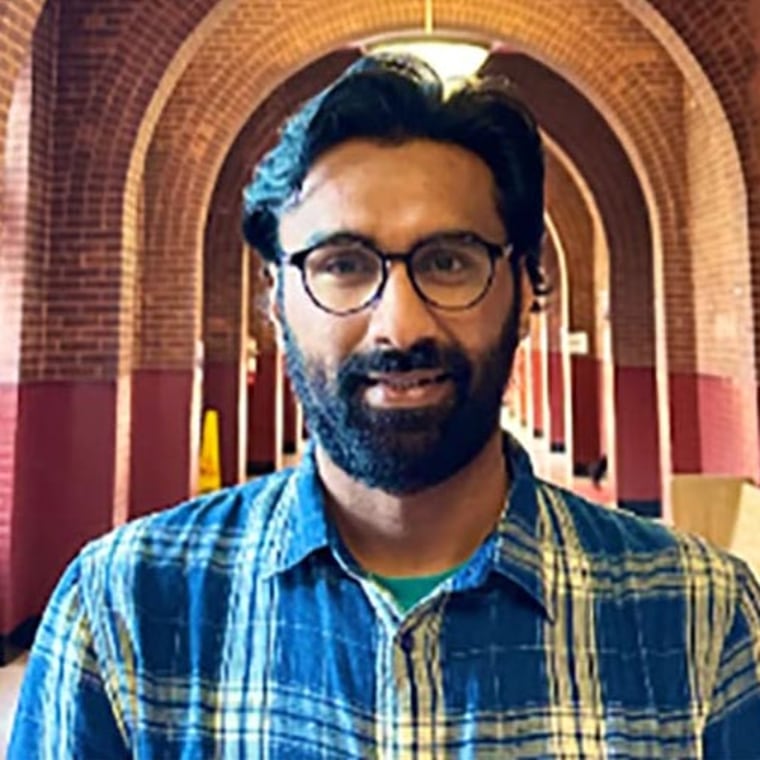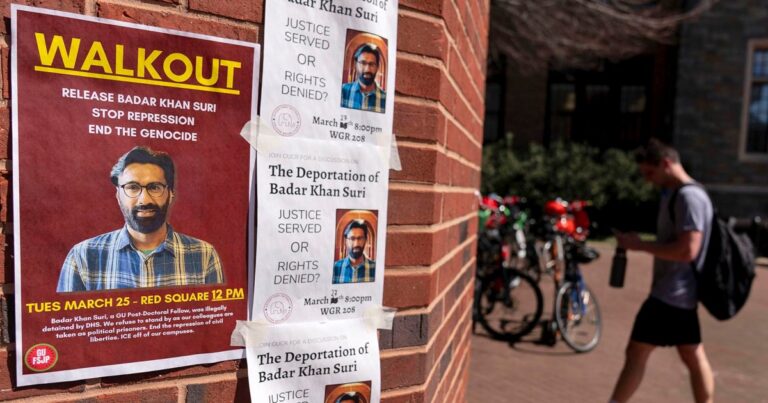Badar Khan Suri, the postdoctoral scholar and professor at Georgetown University who was arrested and targeted for deportation by the Trump administration, has been released.
Khan Suri, has been held in the Prairieland Detention Center in Texas since March, left the Immigration and Customs Enforcement facility Wednesday afternoon. It comes after Eastern District of Virginia Judge Patricia Giles said in her ruling that Khan Suri’s detention was in violation of the First Amendment, the right to free speech, and the Fifth amendment, the right to due process.
Khan Suri spoke out for the first time after being released.
“There was no charge, there was nothing,” he said from outside the detention center. “They made a sub human out of me.”
Khan Suri’s attorneys had filed a petition that sought to determine whether his detainment was lawful, known as a habeas corpus petition. He was sent to Texas after first being detained overnight at a Virginia facility, and then transferred to Louisiana due to a lack of space in Virginia, according to court documents.
The government last month filed a motion to move the case out of Virginia, arguing that the habeas petition must be filed where the petitioner is detained. Giles denied that motion, citing the lack of clarity as to where Khan Suri actually was when the petition was filed.

Khan Suri, who has been a postdoctoral fellow at Georgetown for the past three years, was accused by the Department of Homeland Security of “actively spreading Hamas propaganda and promoting antisemitism on social media.”
Khan Suri “has close connections to a known or suspected terrorist, who is a senior advisor to Hamas,” DHS spokesperson Tricia McLaughlin said on X.
In her ruling, Giles said that the government had failed to provide evidence that Khan Suri was a flight risk or danger to the community. She added that it also did not provide proof to support that Khan Suri would be a national security risk.
His wife, Maphaz Ahmad Yousef, said that hearing the judge’s words “brought tears to my eyes.”
“I wish I could give her a heartfelt hug,” Yousef said at a news conference.
ACLU attorney Sophia Gregg said the case was about more than the release of Khan Suri.
“Americans don’t want to live in a country where the federal government disappears people whose views it doesn’t like,” she said at the news conference. “If they can do this to Dr. Suri, they can do this to anyone.”
Yousef said that while the ordeal has been difficult for her family, Khan Suri said that he did not regret his support for Palestine.
“Badar told me, ‘If my suffering in the detention center is because I married to a Palestinian and because I spoke out against the genocide in Gaza, then I should wear it as a badge of honor,’” she said at the news conference.
Yousef also said called for the freedom of those who have been “disappeared and detained,” including Columbia graduate student and pro-Palestinian activist Mahmoud Khalil, who’s been in ICE custody since early March.
“I can’t wait for the moment when my husband will reunite with my children,” she said. “It’s a victory, a victory for all of us, a victory for justice.”
Yousef, an American citizen who is originally from Gaza, is also a student at Georgetown. Her father, Ahmed Yousef, is a former adviser to now-deceased Hamas leader Ismail Haniyeh. In an interview with The New York Times, Ahmed Yousef said he left his position more than a decade ago. He has also been outspoken in his criticism of Hamas.
According to court documents, Khan Suri met his father-in-law in person for the first and only time in 2013 to ask for his blessing to marry Yousef. Since getting married, Khan Suri has spoken to Ahmed Yousef from time to time about “family matters and his academic pursuits,” the documents said. But since the entire family moved to the U.S. in 2023, Khan Suri has not spoken directly to his father-in-law.
Maphaz Ahmad Yousef, who’s lost several family members in the war in Gaza, has posted information about the events occurring there, court documents say.
“On not more than a handful of occasions, Dr. Khan Suri also made social media posts expressing support for the Palestinian people, criticizing the death toll in Gaza, affirming international law principles, and criticizing U.S. support for Israel’s war in Gaza,” the documents said.
Khan Suri says he has never attended any protests.
“I came to the U.S. to work and raise my family: I go to work, come home late, and still they came and took me and broke my family,” Khan Suri said in a news release. “In my work, I’ve seen lots of injustice. I just didn’t think it would happen to me here.”
Khan Suri’s attorney Hassan Ahmad previously told NBC News that Khan Suri has never made any pro-Hamas or antisemitic comments, calling his detention “contemptible.”
Khan Suri’s habeas petition also described the conditions in the detention center. When first arriving in Texas, the documents said, Suri wasn’t assigned to a bed in a dorm and was instead put in the facility’s “TV room,” where the television runs every day from 5 a.m. to 2 a.m, the petition said. Khan Suri had also requested religious accommodations, the petition said, and only received halal food after five days.
“On April 2, officers came and told him that he had complained through his lawyer about his religious accommodations and asked him for more details. After Dr. Khan Suri reaffirmed his needs, he was given a prayer mat, a Quran, and provided a space on a bed in the dorm, outside of the TV room.”
While detained, Khan Suri was issued a bright red uniform, usually reserved for individuals classified as high security due to their criminal history, the petition said. When he asked about his uniform, Khan Suri was told that he fell under the category due to his association “with a known criminal group — presumably based on Respondents’ unfounded claims of his connections to Hamas,” the petition said.
“Due to his classification and security protocols at the facility, Dr. Khan Suri is only permitted two hours per week of recreation,” the petition said.


